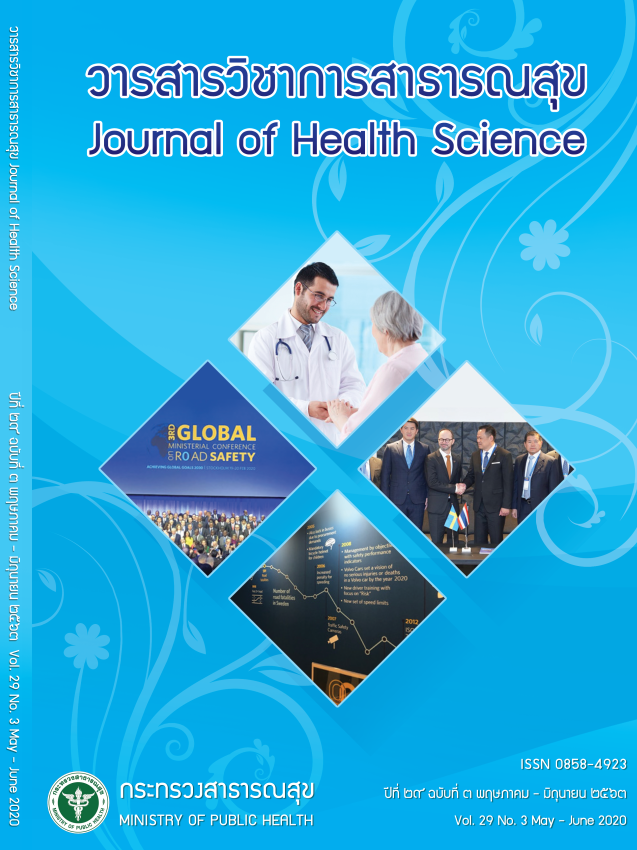Graduated Identity Development Process of Colleges under Praboromaratchanok Institute Jurisdiction, Ministry of Public Health
Keywords:
graduated identity, identity development, humanized care, transformative learningAbstract
This main objective of this research was to explore development process for identity development of graduates from Praboromaratchanok Institute. The mixed method design, a combination of research and analysis of both qualitative and quantitative data, was employed. Qualitative method was used to study graduated identity and developing process of graduated identity by group discussions and interviews; and the quantitative research was used to study the opinions of graduated users/teamwork/supervisor towards the graduate identity, and to validate the qualitative data analysis. The 187 participants for the qualitative research consisted of administrators, faculty lecturers, clinical mentors in practical training field, and fourth year students. Quantitative research samples were 370 graduated from colleges under the Praboromarajchanok Institute, academic year 2015. Quantitative research tools was a questionnaire with 5 likert scale with 0.87 Chronbach’s alpha coefficient. Data were analyzed by descriptive statistics: percentage, mean, and standard deviation. The research showed that graduate identity of the colleges under the Praboromarajchanok Institute was “humanized care”. This was composed of 3 elements: service mind (S), analytical thinking (A), and behavior lead to patients’ participation (P). The overall score was at good level. For the process of identity development, there were the top 5 main processes which included: (1) instructor as a role model, (2) teaching and learning method of small group (more often were reflection and case study), (3) family like system in the colleges, (4) integration between teaching learning and activities outside classroom to support learning, and (5) organization policy. Moreover, it was found that the graduates’ identity was in line with the core value of Ministry of Public Health (M O P H). The learning environment was opened and healthy; and the teaching and learning process facilitated transformative learning.
Downloads
References
ชาญณรงค์ พรรุ่งโรจน์. อัตลักษณ์ผู้เรียน เอกลักษณ์สถานศึกษา. กรุงเทพมหานคร: ชิโน่พับลิชชิ่งแอนด์แพคเกจจิ้ง; 2557.
โชติกา ศรีประเสริฐ. การรวบรวมความหมายของอัตลักษณ์ [อินเทอร์เน็ต]. 2554 [สืบค้นเมื่อ 16 มี.ค. 2560]. แหล่งข้อมูล: http://chotika51-thesis.blogspot.com/2011/07/blog-post.html
กุสุมา กูใหญ่. กระบวนการสร้างอัตลักษณ์: มุมมองจิตวิเคราะห์และสังคมศาสตร์ [อินเทอร์เน็ต]. 2556 [สืบค้นเมื่อ 16 มี.ค. 2560]. แหล่งข้อมูล: http://kusumakooyai.blogspot.com/2013/04/blog-post_5.html
ฉัตรทิพย์ สุวรรณชิน, พนมพร จันทรปัญญา. การสร้างอัต-ลักษณ์ของผู้เรียนในระดับอุดมศึกษา. วารสารปัญญาภิวัฒน์ 2558;7(2):267-80.
สถาบันพระบรมราชชนก. คู่มือการดำเนินการเพื่อให้เกิด อัตลักษณ์บัณฑิต สถาบันพระบรมราชชนก. พิมพ์ครั้งที่ 2. กรุงเทพมหานคร: ยุทธรินทร์; 2554.
ICT MOPH. ค่านิยมที่เราชาวสาธารณสุขควรเป็น [อินเทอร์เน็ต]. 2559 [สืบค้นเมื่อ 16 มี.ค. 2560]. แหล่งข้อมูล: https://www.facebook.com/MophICT/posts/1141768402529667:0
กระทรวงสาธารษรสุข. ค่านิยมองค์กร (core value): MOPH. [อินเทอร์เน็ต]. 2016 [สืบค้นเมื่อ 13 ต.ค. 2559]. แหล่งข้อมูล: http://bps.moph.go.th/new_bps/sites/default/files/Positioning_MoPH_2559.pdf
Yamane T. Statistics, an introductory analysis. 2nd Ed. New York: Harper and Row; 1967.
Hoy WK. The technical core: learning and teaching [In-ternet]. 2013 [cited 2018 May 1]. Available from: www.waynekhoy.com/power_points.html
สายสวาท เผ่าพงษ์, จุฑาทิพย์ ศิรินภาดล, สิริเพ็ญโสภา จันทร-สถาพร, ภิรมย์ลักษณ์ มีสัตยานันท์. อัตลักษณ์บัณฑิต วิทยาลัยพยาบาลบรมราชชนนี นครราชสีมา. วารสารวิทยา-ลัยพยาบาลบรมราชชนนี นครราชสีมา [อินเทอร์เน็ต]. 2555 [สืบค้นเมื่อ 29 พ.ค. 2561];18:5-16 แหล่งข้อมูล: https://tci-thaijo.org/index.php/Jolbcnm/issue/view/979
สุภาภรณ์ อุดมลักษณ์, พิมพิมล วงศ์ไชยา, สิริสุดา เตชะวิเศษ, สมศรี สัจจะสกุลรัตน์. อัตลักษณ์บริการสุขภาพด้วยหัวใจความเป็นมนุษย์ของบัณฑิต วิทยาลัยพยาบาลบรม- ราชชนนีพะเยา. วารสารพยาบาลกระทรวงสาธารณสุข. [อินเทอร์เน็ต]. 2558 [สืบค้นเมื่อ 16 มี.ค. 2560];25(3): 14-26. แหล่งข้อมูล: https://tci-thaijo.org/index.php/tnaph/article/view/47144
Meded Tweet. การเรียนรู้จาก role model (1) [อินเทอร์เน็ต]. 2560 [สืบค้นเมื่อ 1 ส.ค. 2561]. แหล่งข้อมูล: http://mededtweet.blogspot.com/2017/12/role-model-1.html?m=
กรรณิกา วิชัยเนตร. การสะท้อนคิด: การสอนเพื่อให้นักศึกษาพยาบาลพัฒนาการคิดอย่างมีวิจารณญาณในการฝึกปฏิบัติการพยาบาล. วารสารพยาบาลตำรวจ [อินเทอร์เน็ต]. 2557 [สืบค้นเมื่อ 12 ก.ย. 2561];6(2):188-98. แหล่งข้อมูล: https://tci-thaijo.org/index.php/policenurse/article/view/.../23931
พีรนันท์ วิศาลสกุลวงษ์, สุมิตตา สว่างทุกข์. การเรียนรู้ผ่านการสะท้อนกลับการปฏิบัติของนักศึกษาพยาบาลในห้องคลอด: วิจัยเชิงคุณภาพ. วารสารเกื้อการุณย์ [อินเทอร์เน็ต]. 2558 [สืบค้นเมื่อ 12 ก.ย. 2561];22(2):57-70 แหล่งข้อมูล: www.kcn.ac.th/KCN-Journal/no2-2558.html
The’z James Pinlantum. วิธีสอนโดยใช้กรณีศึกษา [อินเทอร์เน็ต]. 2015 [สืบค้นเมื่อ 9 ส.ค. 2561]. แหล่งข้อมูล: https://prezi.com/ibheqkhoc9nj/presentation/
ปรียา สมพืช. การจัดการเรียนรู้เชิงรุกโดยใช้รูปแบบการเรียนการสอนด้วยกรณีศึกษา: organized active learning by instructional model with case-based. วารสารวิจัยราชภัฏ-พระนคร สาขามนุษยศาสตร์และสังคมศาสตร์ [อินเทอร์เน็ต]. 2559 [สืบค้นเมื่อ 7 ก.ย. 2561];11(2):260-70. แหล่งข้อมูล: https://www.tcithaijo.org/index.php/PNRU_JHSS/article/view/65442/59427
จิราพร วรวงศ์, วิไลวรรณ วัฒนานนท์, ปราณี แสดคง, พัช-รินทร์วินา เพิ่มยินดี, แสงดาว จันทร์ดา. เส้นทางพัฒนา อัตลักษณ์บัณฑิต ภายใต้ระบบครอบครัวเสมือน วิทยาลัย-พยาบาลบรมราชชนนี ขอนแก่น [อินเทอร์เน็ต]. 2561 [สืบค้นเมื่อ 7 ก.ย. 2561]. แหล่งข้อมูล: http://kusuma-kooyai.blogspot.com/2013/04/blog-post_5.html
จุรี แสนสุข, นิระมล สมตัว, แสงดาว จันทร์ดา. การศึกษาแบบบูรณาการโดยใช้ระบบครอบครัวเสมือนต่อความคงทนของอัตลักษณ์จิตบริการด้วยหัวใจความเป็นมนุษย์ ในบัณฑิตโครงการผลิตพยาบาลชุมชน เพื่อชุมชน ของชุมชนและโดยชุมชนจังหวัดขอนแก่น. วารสารการพยาบาลและการดูแลสุขภาพ [อินเทอร์เน็ต]. 2559 [สืบค้นเมื่อ 16 มี.ค. 2560];39(3):140-6. แหล่งข้อมูล: https://www.tci-thaijo.org/index.php/jnatned/article/view/69166/56271
สำนักมาตรฐานและประเมินผลอุดมศึกษา, สำนักงานคณะ-กรรมการการอุดมศึกษา. รายงานการวิจัยเรื่องการศึกษา วิเคราะห์รูปแบบที่เหมาะสมในการพัฒนาบัณฑิตอุดมคติ-ไทย. กรุงเทพมหานคร: ภาพพิมพ์; 2547.
RT#22 RU. สภาพแวดล้อมที่เหมาะสมกับการเรียนรู้ learn-ing Environment [อินเทอร์เน็ต]. 2018 [สืบค้นเมื่อ 30 ส.ค. 2561]. แหล่งข้อมูล: kittiponget22ru.wordpress.com/2014/02/21
สำนักนโยบายและยุทธศาสตร์ กระทรวงสาธารณสุข.ประชาชนสุขภาพดี เจ้าหน้าที่มีความสุขระบบสุขภาพยั่งยืน [อินเทอร์เน็ต]. กรุงเทพมหานคร: สำนักนโยบายและ-ยุทธศาสตร์ 2559 [สืบค้นเมื่อ 12 มิ.ย. 2561]. แหล่งข้อมูล: http://bps.moph.go.th/new_bps/sites/default/files/Positioning_MoPH_2559.pdf
วิจารณ์ พานิช. เรียนรู้สู่การเปลี่ยนแปลง transformative learning. กรุงเทพมหานคร: เอส อาร์ พริ้นติ้ง แมสโปรดักส์; 2558.
เทิดศักดิ์ ผลจันทร์. การเรียนรู้แบบลงลึกและการคิด ตรึกตรอง (reflection) [อินเทอร์เน็ต]. 2018 [สืบค้นเมื่อ 21 ก.ย. 2018]. แหล่งข้อมูล: http://www.med.nu.ac.th/dpMed/fileKnowledge/80_2016-12-06.pdf
Downloads
Published
How to Cite
Issue
Section
License

This work is licensed under a Creative Commons Attribution-NonCommercial-NoDerivatives 4.0 International License.







